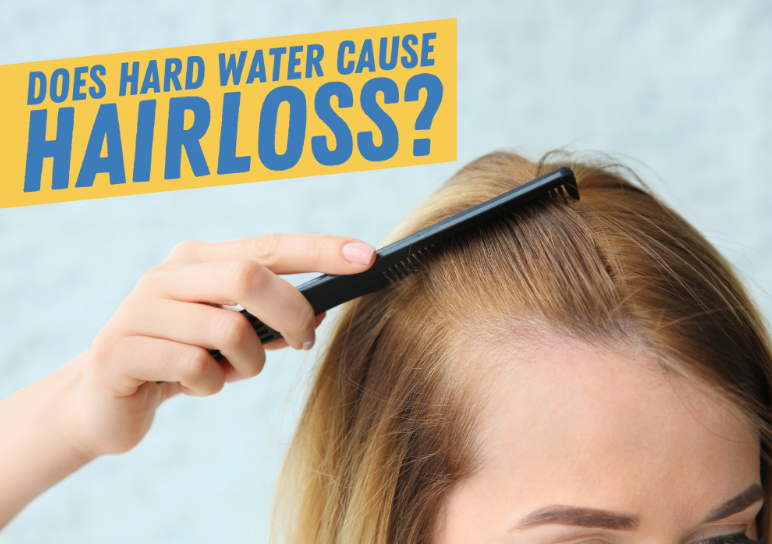Hard Water and Hair Loss: How Are They Connected?
Mineral buildup from hard water can leave your hair dry and more susceptible to damage. With the right care, you can protect your hair and keep it healthy. If you’re experiencing hair loss or dry hair, hard water might be the cause. Hard water and hair loss are linked because minerals like calcium and magnesium can build up on your hair, making it weak and dry. Learning how hard water affects your hair and how to reverse the effects of hard water on hair can help you protect and improve your hair’s health. What Is Hard Water and How Does It Affect Your Hair? Hard water, with its high calcium and magnesium content, causes mineral buildup on hair, leading to dryness, breakage, and potential hair loss. Hard water has high amounts of calcium and magnesium, which leave mineral buildup on your hair and scalp. This buildup can make your hair dry, weak, and prone to breakage. Over time, it can also lead to hard water and hair loss by damaging your hair follicles. How Hard Water Affects Your Hair Using clarifying shampoos, a shower filter, or a water softener can help protect your hair and keep it healthy. Dulls Natural Shine: Removes natural oils, making hair look lifeless. Weakens Hair Strands: Causes split ends and hair breakage. Creates Product Buildup: Prevents moisture from reaching your hair. Can Hard Water Really Cause Hair Loss? Yes, hard water can cause hair loss by clogging follicles and weakening hair strands due to mineral buildup. Yes, hard water can contribute to hair loss by causing mineral buildup on the scalp and hair. This buildup, rich in calcium carbonate and magnesium, clogs hair follicles, weakens the hair shaft, and disrupts hair growth cycles. Over time, hard water exposure leads to: Dry, brittle hair due to loss of natural oils. Hair breakage and split ends from hard water minerals. Itchy scalp caused by soap scum and calcium buildup. How to Prevent Hard Water And Hair Loss Proper hair care routines can protect your hair health and prevent further damage. Addressing the effects of hard water and hair loss is essential to reduce hair loss effectively. Install a water softener or use a shower filter to improve water quality. Use clarifying shampoos or a vinegar rinse to remove mineral buildup. Incorporate a deep conditioning hair mask to restore moisture and nourish hair strands. What Indicators Suggest Hair Damage Caused by Hard Water? Signs of hard water hair damage include dryness, dullness, breakage, and an itchy scalp caused by mineral buildup. Hard water impacts hair health by causing mineral deposits to accumulate on the strands, leading to a rough texture and reduced strength. It can strip away natural oils, leaving your hair feeling dry and brittle. Key indicators include: Itching, flakiness, and buildup caused by soap residue can lead to discomfort and hinder scalp health. Hair appears dull and lifeless due to calcium and magnesium deposits, which block its natural luster. Hair becomes weak, easily breaks, and is harder to manage due to mineral buildup on the strands. To combat these issues, consider using a chelating shampoo, a vinegar rinse, or installing a shower filter to prevent further damage and restore your hair’s natural elasticity. How Does Calcium Buildup on Hair Impact Its Health? Calcium buildup from hard water makes hair dry and weak, but can be treated with clarifying shampoos, vinegar rinses, and water softeners. Calcium buildup from hard water coats the hair shaft, leading to dryness, brittleness, and dullness. This buildup clogs hair follicles, weakening their structure and contributing to hair loss over time. This ensures healthier hair and minimizes the effects of hard water hair damage. Effects of Calcium Buildup on Hair Reduces hair elasticity, making strands prone to breakage. Blocks absorption of natural oils, leaving hair dry and damaged. Causes mineral buildup, which weighs hair down and diminishes its natural shine. How to Address Calcium Buildup Use a clarifying shampoo to remove hard water minerals. Rinse hair with apple cider vinegar to dissolve deposits. Install a shower filter or consider a water softener for long-term relief. How To Reverse the Effects of Hard Water on Hair? To reverse hard water effects on hair, use chelating shampoos, nourishing masks, vinegar rinses, shower filters, and natural oil treatments. Switch to chelating shampoos to remove mineral buildup and cleanse your hair. Restore hydration with a nourishing hair mask designed for damaged strands. These simple steps help improve hair strength and support overall hair health. Effective Methods: Try a vinegar rinse to dissolve stubborn deposits. Use a shower filter to improve water quality for healthier hair. Apply treatments with natural oils to repair and protect the hair shaft. What Are the Best Ways to Protect Your Hair from Hard Water? Protect your hair from hard water with a shower filter, clarifying shampoo, and regular conditioning. Install a shower filter to remove harmful minerals like calcium and magnesium from the water. Rinse hair with vinegar or lemon juice to clear mineral buildup and balance the scalp’s pH. Use a clarifying shampoo to remove product buildup and a chelating shampoo for stubborn mineral deposits. Apply a deep conditioning mask weekly to restore moisture and repair damaged hair. Consider a water softener to improve water quality and prevent future hard water damage. Finish hair washes with distilled water to avoid further exposure to hard water minerals. Protect hair’s natural shine and strength by maintaining a regular hair care routine with hydrating products. How Can You Identify If Hard Water Is the Cause of Your Hair Problems? You can identify hard water damage by signs like dry, brittle hair, increased breakage, dullness, and an itchy scalp caused by mineral buildup. Hard water often leads to specific signs that can impact your hair health and scalp. Switching to a water softener or using a shower filter can prevent further damage and restore overall hair health. Here’s how you can identify if hard water on hair is causing your hair issues: Common Signs



